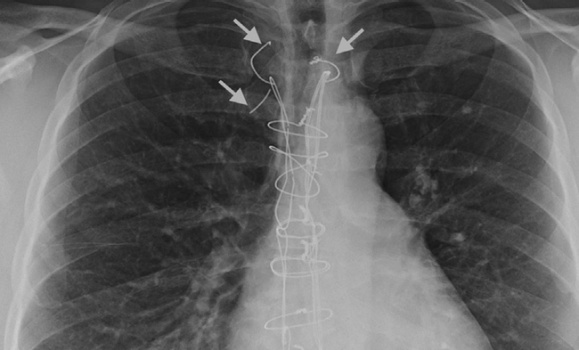Stories
» Go to news mainMigrated fractured sternal wire in proximity to the main pulmonary artery: Case report and review

Dr. James Fraser presented a case of a migrated sternal wire. See full text.
Abstract
Background: We present a case of a 83-year-old man with a prior history of coronary artery bypass who presented to his family physician with progressive symptoms that raised concern for heart failure exacerbation. A chest X-ray was performed, which showed a fractured topmost sternal wire in the lateral projection and indicated that the sternal wire had migrated into the anterior mediastinum. An emergent electrocardiogram-gated flash computed tomography angiography confirmed the location of the fractured wire to be in close proximity to the main pulmonary artery. A discussion of migrated sternal wires with a literature review of cases is provided as well.
Aims: To present a case of a migrated sternal wire and a literature review.
Methods: An extensive literature review using pubmed and medline with relevant keywords was preformed.
Results: 11 known cases of migrated sternal wires with various complications, as detailed in the review table. The mortality rate is low but can be associated with significant morbidity.
Discussion: Fractured wires are quite common and are usually a benign radiographic finding. However, migration of sternal wires is an extremely rare phenomenon. Only a few reported cases in the literature were sternal wires have migrated beyond the sternum, leading to catastrophic clinical consequences, as detailed in the review table.
Conclusion: Sternal wire complications secondary to migration beyond the sternum are rare but potentially fatal. Precise wire location and risk assessment with CT are more appropriate when wire location cannot be clearly delineated by plain film radiography.
Keywords: imaging; sternum; surgery.
Recent News
- Dr. Abraham receives CAIR Award
- Thank you to everyone who joined us for the 30th anniversary Radiology Research Day on May 8th!
- Nova Scotia’s Lung Screening Program expanding to Cape Breton, eastern mainland
- Donor‑supported nuclear medicine technology attracts top medical talent to the QEII
- Building Critical Skills at the Dalhousie Physician Leadership Workshop for Women in Radiology
- CAR/CSTR Practice Guideline on CT Screening for Lung Cancer
- CAR/CSACI Practice Guidance for Contrast Media Hypersensitivity
- CAR Practice Guideline on Bone Mineral Densitometry Reporting: 2024 Update
